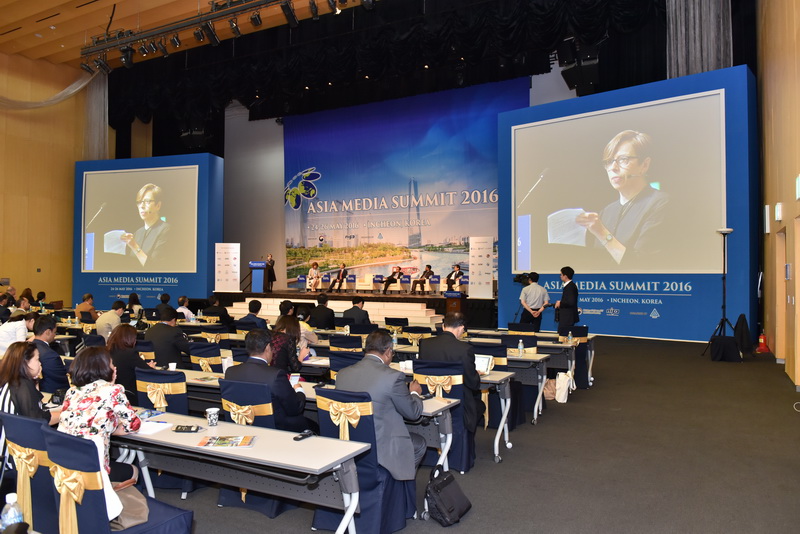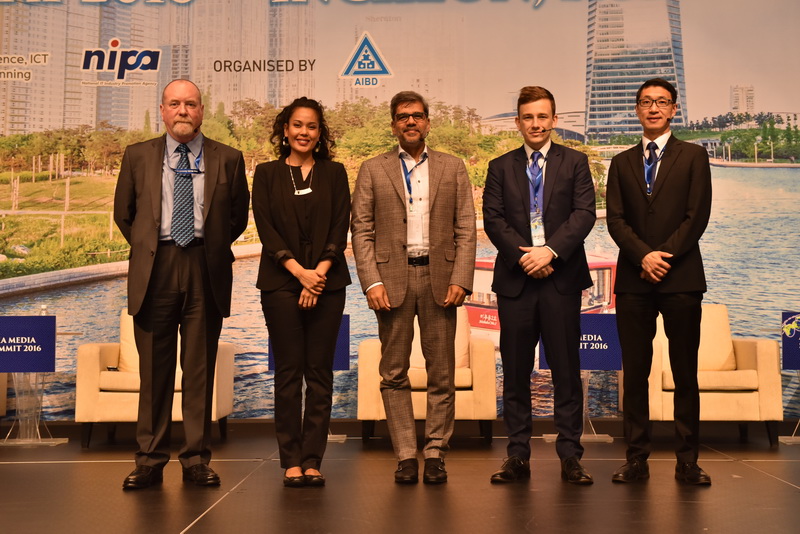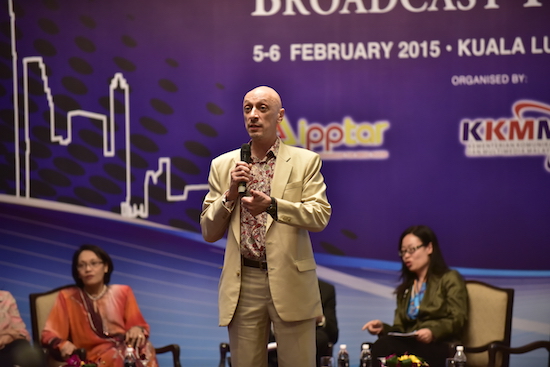Audiences will have many screens to watch news anytime and anywhere, and to draw their attention, particularly the young, broadcast journalists must have a story to tell, one that offers accuracy, analysis, and expertise, and must help audiences make sense of it.
This approach is how BBC World Service has operated in the world, says Ms Francesca Unsworth, Director, World Serive Group, BBC, United KIngdom, emphasising that “content remains queen or king.”
Audiences will have many screens to watch news anytime and anywhere, and to draw their attention, particularly the young, broadcast journalists must have a story to tell, one that offers accuracy, analysis, and expertise, and must help audiences make sense of it.
This approach is how BBC World Service has operated in the world, says Ms Francesca Unsworth, Director, World Serive Group, BBC, United KIngdom, emphasising that “content remains queen or king.”
She spoke at the CEO Roundtable of the Asia Media Summit on 26 May 2016 in Incheon, Korea.
Speaking on the topic “Looking Forward: Vision for Cutting-edge Content,” Ms Unsworth said BBC World Service experiments a lot to keep pace with new consumption habits.
To ensure BBC World Service increase its reputation as one of the most trusted international news providers in the world,“BBC World Service tells stories from a broad range of perspective, using their different languages service. We also tackle issues that local content can’t do the same way such as women rights, homosexuality and free speech in countries like North Korea, Honking and Saudi Arabia,” Ms Unsworth pointed out. In addition, BBC uses new technologies such as drones, 360 degree virtual reality, and live streaming.
She said news around the world is experiencing a digital, commercial, competitive and audience revolution. Broadcasters are developing new business models, confronted by dynamic competitors including digitally-based players and content aggregators like Google, Facebook and Apple, and changing consumption behaviour, especially of the young who are embracing new ways of engaging with news.
To deal with this revolution and serve more countries where freedom is under threat, BBC World Service will soon begin its biggest expansion since the 1940s.
“We will go over the heads of dictators and governments who are averse to open and accessible news and, thus, will make the provision of news more complex,” she said.
In order to sustain their relationships with audiences, which tend to be younger and more female, Ms Unsworth said they will take digital at the heart of what they do by making sure they keep in touch with audiences, talk directly to them and allow them to talk to each other.
Content is Still King
Audiences will have many screens to watch news anytime and anywhere, and to draw their attention, particularly the young, broadcast journalists must have a story to tell, one that offers accuracy, analysis, and expertise, and must help audiences make sense of it.
This approach is how BBC World Service has operated in the world, says Ms Francesca Unsworth, Director, World Serive Group, BBC, United KIngdom, emphasising that “content remains queen or king.”
‘Invasion of Globalised Content’
Asian media is raising concerns about the ‘invasion’ of globalised content on various screens that threatens local content and may necessitate government regulation such as imposing a content quota system to preserve local cultures in the region.
In Bhutan, Bollywood programmes and Korean dramas and variety shows have invaded local content, says Kinley Dorji, a journalist and Secretary, Ministry of Information of Bhutan during the Moderated Debate at the 13th Asia Media Summit in Incheon, Korea.
Monetising Content
Broadcasters were urged to preserve good content by digitising and managing it efficiently in order to share this valuable resource to future generations and enable companies to make some money.
“So much good content is stored in some offices and libraries of government agencies, private companies and broadcast organisations that unless this is digitised, it will simply vanish in three to five years,” Mr Sanajay Salil, Managing Director, MediaGuru, India, said in his presentation during the plenary session on “Monetising Content and Dealing with Copyright Issues” at the 13th Asia Media Summit on 26 May 2016 in Incheon, Korea.
Big Challenges for Broadcasters
Dato’ Sri Ahmad Shabery Cheek, Minister of Communications and Multimedia of Malaysia, raised the possibility that viewers might stop watching TV in the traditional sense unless broadcasters dealt seriously with new trends impacting their industry, among them; the rising popularity of over-the-top or OTT services, the reach and influence of social media, and evolving media consumption behaviour.
Story with Impact
Mr. Turan Ali, Director of Radio Netherlands Training Centre, Netherlands, has identified various elements in producing programmes that have an impact consistently with audiences.
Art of Good Storytelling
Ms. Poonam Sharma, Director of Singapore MediaGuru, urged broadcasters to relearn the art of good storytelling, and stressed that winning in today’s multimedia landscape means not only creating a story that is relevant and interactive, and one that provokes and engages audiences, but also delivering or executing it creatively.
Future of Broadcasting
The future of broadcasting lies not only in producing creative content that is relevant, innovative, and engaging, but also in adopting formats that keep pace with the demands of various platforms and shifting audience preferences.
Creating Impact: Media in Today’s Society
Media’s power is enormous in today’s society. It can facilitate public debate and discussion and shape public opinion. Its influence extends to its role in development, setting an agenda it deems relevant to nation building. A media with a capacity and interest to report issues on national strategies, social justice and inclusion, social progress, environmental sustainability, and enabling regulatory environment can create wealth in society, develop people’s potential to pursue creative and productive lives, and contribute towards equity and equality for all people.
A Successful Asia Media Summit in Hanoi
[img_assist|nid=1662|title=|desc=|link=none|align=left|width=100|height=66]The Asia Media Summit has concluded in Hanoi, contributing to a growing consensus that it was no longer business as usual for broadcasters in the battle for attention that has become more intense than ever in the digital world.
In his closing remarks, AIBD Director Yang Binyuan said the Summit has helped raise awareness and understanding among broadcasters of new and innovative ideas as well as opportunities offered by technological advances and multiple delivery platforms such as the web, mobile, and social media that will expand their audience reach, address strong competition and improve their products and services as well as business returns.
TV Content Development with French Expertise
TV CONTENT FORMATS DEVELOPMENT
Inspiration – Creativity - Innovation
In the framework of our collaboration with the French Ministry of Foreign Affairs and the Regional Audiovisual Attaché based in Singapore at the French embassy, the AIBD has set up in 2009 a 3-year plan dedicated to TV content development only.2010 is the 2nd year of the plan offering 4 regional workshops.
All over the year 2010, professionals from VTV (Vietnam), MCOT (Thailand), GMA (Philippines), SCTV (Indonesia) and Media Prima (Malaysia) have explored how to design and produce short TV programme, Youth TV Programme, Entertainment TV Programme and Variety Show.







